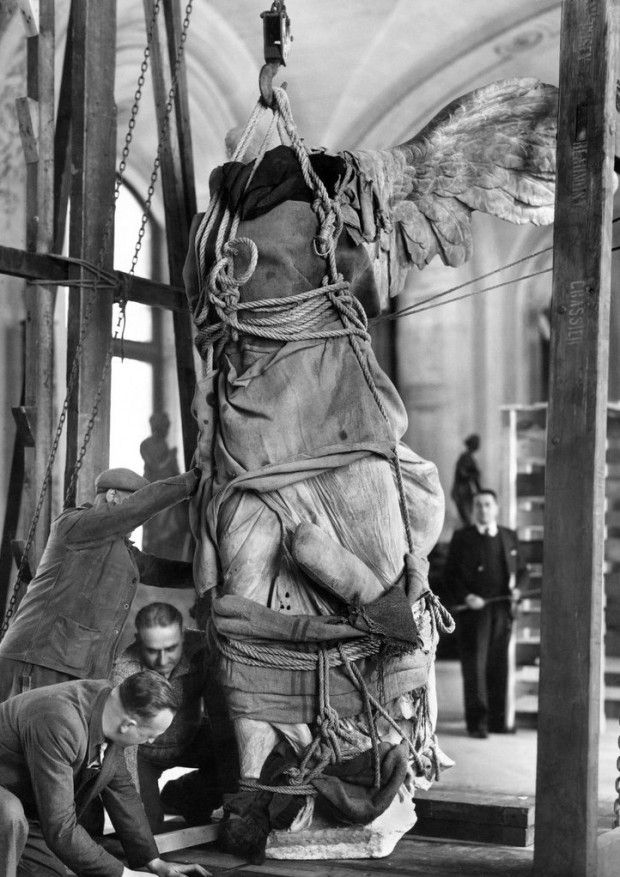Tuesday 23 January 1940
 |
| The Swedish Volunteer Corps fought with the Finns against the Red Army in the area of Salla, during the Winter War. A Bofors 37 mm AT gun is left standing as part of a memorial at the site. |
Winter War Army Operations: The Soviets mount another attack on the Finnish line at Taipale, but it is beaten back after hand-to-hand fighting in the trenches.
At Salla, many of the advanced Soviet troops have been pushed back to the town. A small, isolated force remains at Maerkaejaervi a few miles further down the road, but it is cut off. Supplies are being air-dropped to it.
Finnish 9th Division, the victors at Suomussalmi under (now General) Siilasvuo, arrive in Kuhmo. Their next mission is to attack the Soviet 54th Division. This is one of the divisions that Timoshenko's plan leaves without a purpose, and it is to receive no reinforcement and reduced priority. Basically, the Soviet division has been left to live or die on its own where it stands and using its own resources.
The Soviet 7,000 shell daily bombardment of Summa continues.
Battle of the Atlantic: One of Germany's most successful U-boat commanders, Joachim Schepke, gets two victories.
U-19 (Kapitänleutnant Joachim Schepke) torpedoes and sinks 1,598-ton Norwegian freighter Pluto off the southeast Scottish coast. All 22 crew survive, the ship had just left convoy HN-8 and was traveling further south unescorted. The attack is at 08:43.
U-19 quickly scores another kill, the 1,528-ton British freighter Baltanglia. It also had been in Convoy HN-8 and was traveling down the coast unescorted. All 28 crew survive and are picked up by local fishing boats. This attack is at 08:55, just a dozen minutes after the previous one. Schepke uses one torpedo on each ship.
Finnish 1,333-ton freighter Onto hits a mine laid by U-56 on 8 January 1940 and sinks near Smith's Lightvessel, Cross Sand. All 18 crew survive and are picked up by a British destroyer and a Greek freighter.
The British at Gibraltar release the two US freighters Excambion and Excellency that it has seized. The authorities confiscate 470 sacks of mail bound for Italy and Germany.
Britain and France jointly warn that they will attack German shipping encountered in the Pan-American neutral zone.
Western Front: Performers sent to entertain the BEF troops report that the ENSA entertainment organization is in a "chaotic muddle." ENSA officials are told to report to the War Office.
South Africa: General Hertzog, leader of the opposition, delivers a speech to the South African Parliament in support of peace which is widely interpreted as pro-German. Jan Smuts immediately rebuts it.
Yugoslavia: Italian Foreign Minister Count Ciano and Ustaše leader Ante Pavelić discuss plans for an insurrection that would separate the province of Croatia from Yugoslavia. Italy considers the Balkans to be within its sphere of influence.
Japan: Japan lodges a formal protest over the British seizure of 21 German passengers on the Asama Maru on 21 January 1940.
Polish Government-in-exile: The Polish National Council meets in Paris for the first time instead of Anvers, with all Polish parties represented. Ignacy Paderewski is chosen as Speaker of the National Council of Poland, the Polish Parliament-in-exile.
British Homefront: The Government, alarmed at the sharp rise in road accidents due to the blackout (1200 killed in December alone), decides to take action: it lowers the speed limit in built-up areas during darkness from 30 mph to 20. The blackout continues despite the fact that there have been no Luftwaffe raids on British cities.
American Homefront: A monster snowstorm hits large portions of the eastern United States, and much worse than predicted. It is known as "the Great Snow of 1940." Women city workers in Richmond, Virginia (over 16 inches of snow) are told they can stay home, but male workers are still expected to show up because the Mayor can walk to work.
China: The Japanese 22nd Infantry Division is attacking toward Shaohsing against the 3rd Chinese War Area.
 |
| A reporter rides a mule during the Great Snow of 1940 in Baltimore, Maryland. |
January 1940
January 1, 1940: Finns Carve up the SovietsJanuary 2, 1940: Finnish Counterattacks Continue
January 3, 1940: Soviets Trapped
January 4, 1940: Soviet Breakout Attempts Fail
January 5, 1940: Dicing Up the Soviets
January 6, 1940: Soviet 44th Division Runs
January 7, 1940: Shakeup in Soviet High Command
January 8, 1940: Ratte Road Battle Ends
January 9, 1940: British Submarines in Peril
January 10, 1940: Mechelen Incident
January 11, 1940: Finns Surround More Soviets
January 12, 1940: New Soviet Attacks at Taipale
January 13, 1940: Fall Gelb Postponed
January 14, 1940: Japan's Government Falls
January 15, 1940: Soviets Prepare More Carefully
January 16, 1940: German Atrocities Uncovered
January 17, 1940: Bletchley Park in Action
January 18, 1940: New Hope for Allied Shipping
January 19, 1940: Finnish Attacks at Salla
January 20, 1940: Churchill Urges Cooperation
January 21, 1940: Asam Maru Incident
January 22, 1940: Dissension Within British Government
January 23, 1940: Dissension in South Africa
January 24, 1940: NKVD Blocking Detachments
January 25, 1940: Auschwitz Site Selected
January 26, 1940: Millionaire Bunker Destroyed
January 27, 1940: U-20 Sinks Four Ships
January 28, 1940: Softening Up the Finns
January 29, 1940: Moscow Willing to Talk
January 30, 1940: Hitler Throws Down the Gauntlet
January 31, 1940: Timoshenko Is Ready
2019



